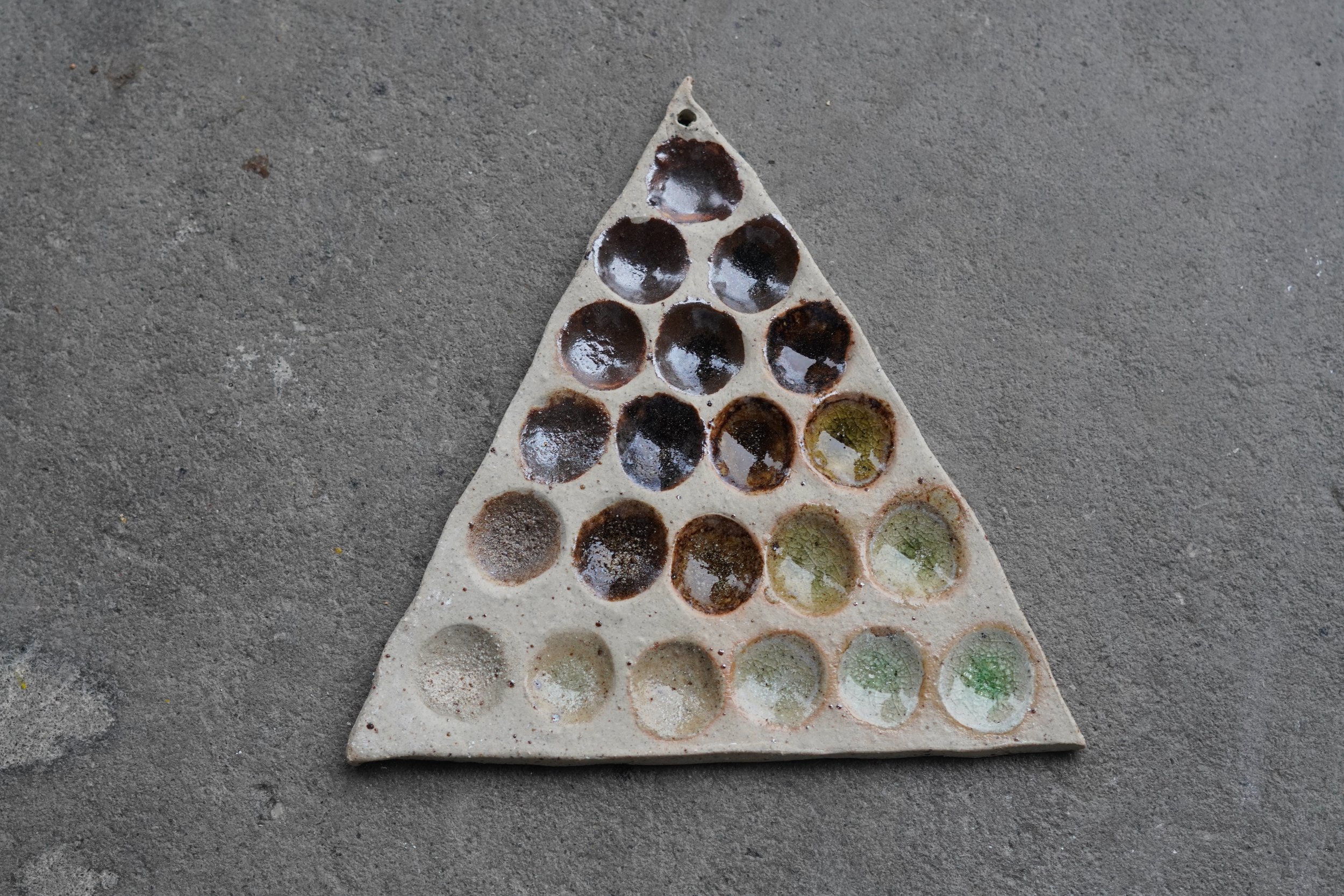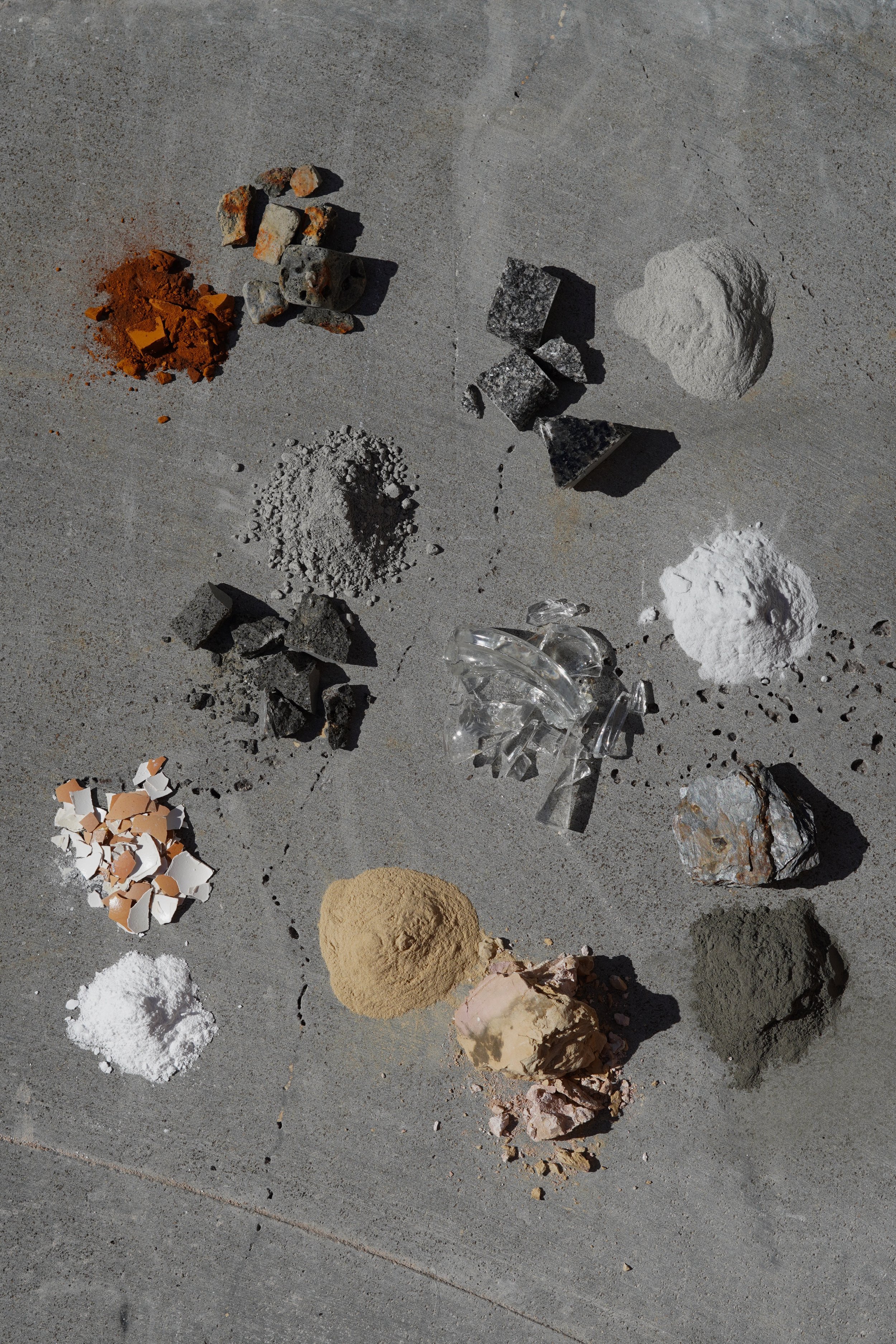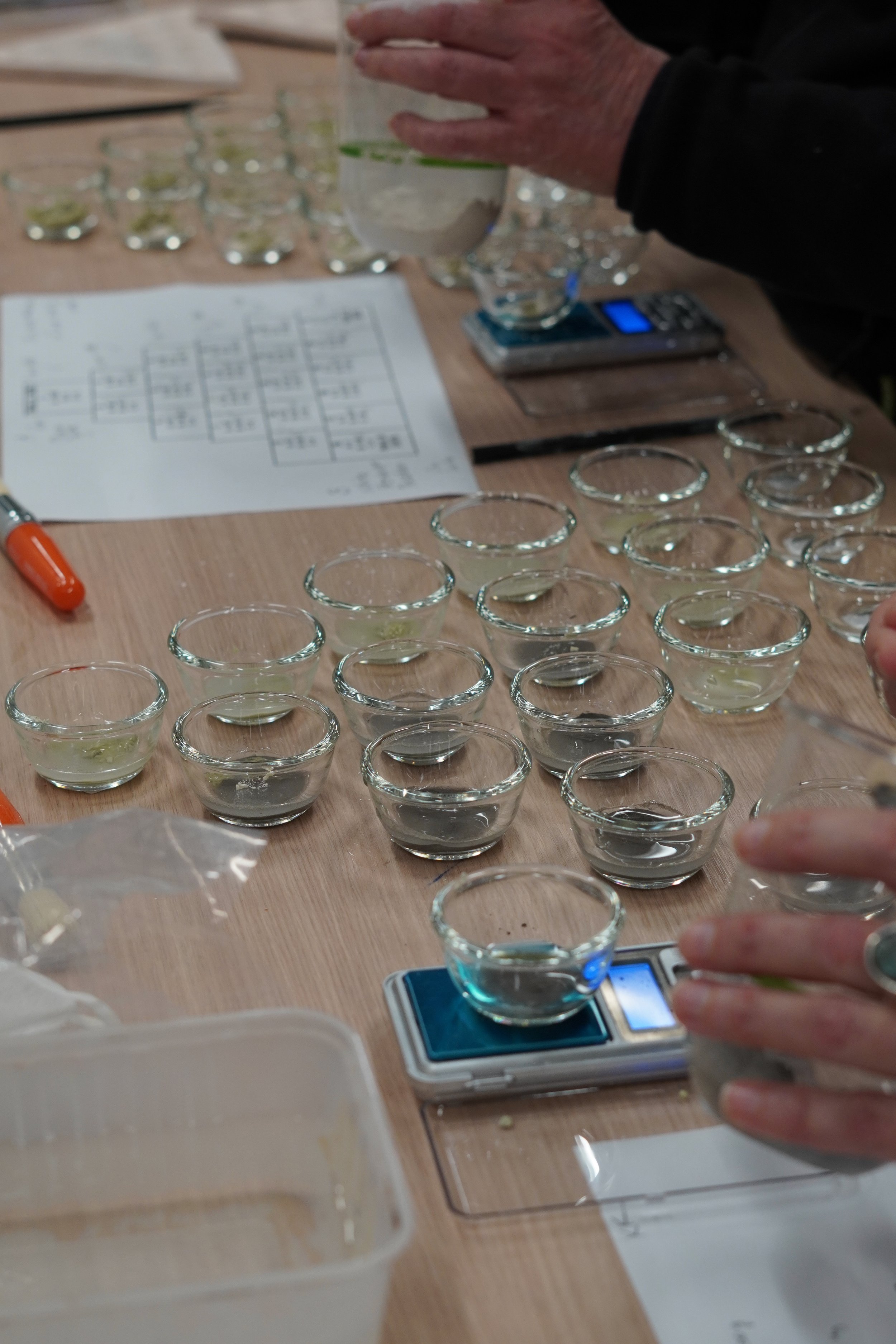


Online Zero Waste Glazes Workshop
This live two hour online workshop offers a unique opportunity to learn how to make environmentally and socially conscious ceramic glazes and pigments using only repurposed materials. Suitable for artists, designers and craftspeople with any amount of ceramic experience.
Join the next wave of creatives changing the status quo in the field of ceramics with an ethic of care and a deep connection to the source and impact of all chosen materials. Participants will learn how to source and process a range of their local ‘waste’ materials as well as make their own triaxial glaze tests to develop recipes.
Triaxial glaze tests use percentages to blend three materials or glazes together and are the easiest way to develop glaze recipes without extensive glaze chemistry knowledge.
Claire Ellis has experience teaching this one-of-a-kind workshop in her Melbourne studio for the past two years and it’s now available internationally due to popular demand. Claire is committed to making alternative approaches to materials more accessible and sharing her knowledge. Her teaching environments are relaxed and welcoming.
The workshop is part webinar and part tutorial with questions and discussion at the end. It will be recorded with subtitles available in any language.
Workshop Outline:
Acknowledgement of country and custodianship
Why do this work?
Semantics & Communication
How to source
How to process
Food safety and occupational health & safety concerns
How to develop your glazes
Making your test tiles
Choosing your materials
Substituting materials
Mixing your tests
Recipes
Troubleshooting and next steps
Q&A
We will explore ‘waste’ from:
Ceramic studios
Restaurants
Glass manufacturing
Metal working
Stone quarrying and distribution
Mining exploration and operation
Building and demolition
You will learn:
how to develop environmentally and socially conscious glazes
how to make triaxial test tiles
how to source and process local by-products, surplus materials and industrial waste steams for ceramic glazes
Basic glaze chemistry to inform your material selections
OHS, food safety, environmental safety
Included in the workshop:
A PDF workshop summary
A recording of the workshop
Live Q&A
Resource list
Private facebook group for community and support
What to bring on the day:
Questions
A notebook
What you will need afterwards:
3M mask
Hammer, block splitter, or electric crushing tool (options covered in workshop)
Face shield or safety glasses
Sieve (options covered in workshop)
Scale (preferably micro)
21 small dishes or cups
Clay for your test tile
Underglaze pencil
Optional:
Ball mill
Shock absorption gloves
Sagars
Important note:
Workshops are non-refundable but are recorded
FAQ:
Why invest in sourcing and processing our own materials for reuse in ceramics?
-most store bought glazes and ceramic materials have high carbon miles from being shipped and processed all over the world before arriving to supply stores
-mining metals and oxides can create exponentially more waste than the target material, this waste is often toxic and ends up damaging the health of local residents, wildlife and ecosystems (copper, cobalt, zinc, manganese, gold and lithium are well documented examples)
-materials in ceramics shops are not labeled with their origins though some mines supplying the ceramic industry are known to employ child labour, forced labour and other human rights violations, most notably cobalt mines in the Democratic Republic of the Congo, lithium mines in Zimbabwe, Namibia and the Democratic Republic of Congo and Talc mines in Afghanistan controlled by the Taliban.
-many of the rare minerals currently required for the green energy transition are also used in ceramics. The Business and Human Rights Resource Centre recently published a survey claiming more than 300 serious allegations against 115 transition mineral mining companies around the world, ranging from the violation of indigenous land rights, to water pollution, health threats, corruption and a systemic failure to consult local communities. The financial cost of these finite materials will continue to rise quickly as they’re also used in phones, laptops and other electronics with batteries.
-why increase demand for extracted virgin materials when our landfills and recycling centres are overflowing with equally useful and valuable materials?
-this type of work requires resourcefulness but builds creative thinking, problem solving skills and open thinking
-Develop a deeper appreciation for materials
-Create distinct work with a sense of place
-Often people working this way are generous with their knowledge and want to support each other. A rising tide lifts all boats!
I’m a ceramics newbie, how do I know if I’m ready for this workshop?
If you’re interested, you’re ready! No prior glaze experience required.
Will I be able to apply this to my own work?
Yes, we will explore both food safe and decorative options. All information will be provided on how to substitute one or all of your glaze materials with local existing resources as well as ongoing support from Claire.
How is this workshop different to others?
There are no other glaze workshops using only recycled materials or with a focus on how to process them.
“The future will either be green or not at all.” - Bob Brown
This live two hour online workshop offers a unique opportunity to learn how to make environmentally and socially conscious ceramic glazes and pigments using only repurposed materials. Suitable for artists, designers and craftspeople with any amount of ceramic experience.
Join the next wave of creatives changing the status quo in the field of ceramics with an ethic of care and a deep connection to the source and impact of all chosen materials. Participants will learn how to source and process a range of their local ‘waste’ materials as well as make their own triaxial glaze tests to develop recipes.
Triaxial glaze tests use percentages to blend three materials or glazes together and are the easiest way to develop glaze recipes without extensive glaze chemistry knowledge.
Claire Ellis has experience teaching this one-of-a-kind workshop in her Melbourne studio for the past two years and it’s now available internationally due to popular demand. Claire is committed to making alternative approaches to materials more accessible and sharing her knowledge. Her teaching environments are relaxed and welcoming.
The workshop is part webinar and part tutorial with questions and discussion at the end. It will be recorded with subtitles available in any language.
Workshop Outline:
Acknowledgement of country and custodianship
Why do this work?
Semantics & Communication
How to source
How to process
Food safety and occupational health & safety concerns
How to develop your glazes
Making your test tiles
Choosing your materials
Substituting materials
Mixing your tests
Recipes
Troubleshooting and next steps
Q&A
We will explore ‘waste’ from:
Ceramic studios
Restaurants
Glass manufacturing
Metal working
Stone quarrying and distribution
Mining exploration and operation
Building and demolition
You will learn:
how to develop environmentally and socially conscious glazes
how to make triaxial test tiles
how to source and process local by-products, surplus materials and industrial waste steams for ceramic glazes
Basic glaze chemistry to inform your material selections
OHS, food safety, environmental safety
Included in the workshop:
A PDF workshop summary
A recording of the workshop
Live Q&A
Resource list
Private facebook group for community and support
What to bring on the day:
Questions
A notebook
What you will need afterwards:
3M mask
Hammer, block splitter, or electric crushing tool (options covered in workshop)
Face shield or safety glasses
Sieve (options covered in workshop)
Scale (preferably micro)
21 small dishes or cups
Clay for your test tile
Underglaze pencil
Optional:
Ball mill
Shock absorption gloves
Sagars
Important note:
Workshops are non-refundable but are recorded
FAQ:
Why invest in sourcing and processing our own materials for reuse in ceramics?
-most store bought glazes and ceramic materials have high carbon miles from being shipped and processed all over the world before arriving to supply stores
-mining metals and oxides can create exponentially more waste than the target material, this waste is often toxic and ends up damaging the health of local residents, wildlife and ecosystems (copper, cobalt, zinc, manganese, gold and lithium are well documented examples)
-materials in ceramics shops are not labeled with their origins though some mines supplying the ceramic industry are known to employ child labour, forced labour and other human rights violations, most notably cobalt mines in the Democratic Republic of the Congo, lithium mines in Zimbabwe, Namibia and the Democratic Republic of Congo and Talc mines in Afghanistan controlled by the Taliban.
-many of the rare minerals currently required for the green energy transition are also used in ceramics. The Business and Human Rights Resource Centre recently published a survey claiming more than 300 serious allegations against 115 transition mineral mining companies around the world, ranging from the violation of indigenous land rights, to water pollution, health threats, corruption and a systemic failure to consult local communities. The financial cost of these finite materials will continue to rise quickly as they’re also used in phones, laptops and other electronics with batteries.
-why increase demand for extracted virgin materials when our landfills and recycling centres are overflowing with equally useful and valuable materials?
-this type of work requires resourcefulness but builds creative thinking, problem solving skills and open thinking
-Develop a deeper appreciation for materials
-Create distinct work with a sense of place
-Often people working this way are generous with their knowledge and want to support each other. A rising tide lifts all boats!
I’m a ceramics newbie, how do I know if I’m ready for this workshop?
If you’re interested, you’re ready! No prior glaze experience required.
Will I be able to apply this to my own work?
Yes, we will explore both food safe and decorative options. All information will be provided on how to substitute one or all of your glaze materials with local existing resources as well as ongoing support from Claire.
How is this workshop different to others?
There are no other glaze workshops using only recycled materials or with a focus on how to process them.